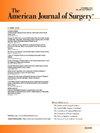超越语言的理解:英语水平对实体器官移植术后结果的影响
IF 2.7
3区 医学
Q1 SURGERY
引用次数: 0
摘要
移植是一个多阶段过程的最后一步,有效的沟通对于最佳的术后结果至关重要。在这个过程中,语言不协调可能会带来许多挑战。方法比较英语水平有限(LEP)和非LEP患者的患者/移植物存活率、排斥反应、再入院率和住院时间(LOS)。肝脏和肾脏患者分别进行评估。从倾向匹配的队列中检索风险比、线性回归和二项逻辑回归。运用词云分析和专题分析探讨再入院原因。结果与说英语的患者相比,接受肝移植的LEP患者出院后再入院的风险更高(p < 0.006), LOS时间更长(p = 0.03)。LEP肾受体的LOS较长(p = 0.042)。结论LEP患者术后预后较差。他们代表着一个多样化的群体,语言只是他们遇到的众多障碍之一。加强教育接触和系统层面的干预可以改善临床结果。本文章由计算机程序翻译,如有差异,请以英文原文为准。
Understanding beyond words: The impact of English proficiency in postoperative outcomes after solid organ transplantation
Background
Transplantation is the final step in a multi-stage process where effective communication is essential for optimal postoperative outcomes. Language discordance may provide many challenges through this process.
Methods
We compared patient/graft survival, rejection, readmission, and length of hospitalization (LOS) between patients with and without limited English proficiency (LEP). Liver and kidney patients were assessed separately. Hazard ratios, linear regression, and binomial logistic regression were retrieved from a propensity matched cohort. Word clouds and thematic analysis were used to explore reasons for readmission.
Results
Compared to English-speakers, patients with LEP undergoing liver transplant had a higher risk of readmission from discharge (p < 0.006), and longer LOS (p = 0.03). Kidney recipients with LEP had longer LOS (p = 0.042).
Conclusion
Transplant recipients with LEP have worse postoperative outcomes. They represent a diverse population, where language is just one of many barriers encountered. Enhanced educational exposure and system-level interventions could improve clinical outcomes.
求助全文
通过发布文献求助,成功后即可免费获取论文全文。
去求助
来源期刊
CiteScore
5.00
自引率
6.70%
发文量
570
审稿时长
56 days
期刊介绍:
The American Journal of Surgery® is a peer-reviewed journal designed for the general surgeon who performs abdominal, cancer, vascular, head and neck, breast, colorectal, and other forms of surgery. AJS is the official journal of 7 major surgical societies* and publishes their official papers as well as independently submitted clinical studies, editorials, reviews, brief reports, correspondence and book reviews.

 求助内容:
求助内容: 应助结果提醒方式:
应助结果提醒方式:


